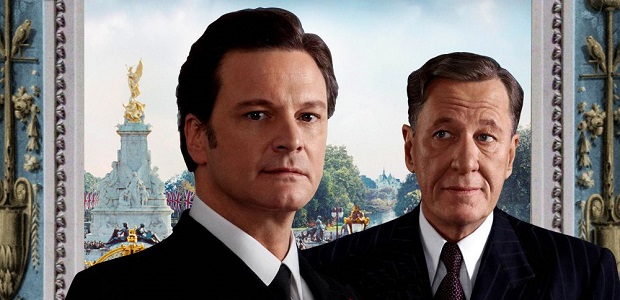
If we learn anything from viewing The King’s Speech it’s the affirmation that even the privileged have weaknesses. Based on the true story of King George the sixth (father of present day British monarch, Elizabeth the second) and his trouble with speech impediment, the film is an inspiring, entertaining, feel good, crowd-pleaser, one that’s actually very good and sustained in no small part by two performances that enthral.
Colin Firth plays the eponymous King with such believable discomfort that watching him we are convinced that to be born into royalty isn’t always an advantage. Thrust into the public eye by a domineering father (King George the fifth, played by Michael Gambon and his commanding voice) ‘Bertie’, as he is affectionately known by those close to him, stammers and stutters while trying to muster up the courage to deliver kingly speeches at public gatherings and radio broadcasts. With careful persuasion by his ever loyal wife Elizabeth (Helena Bonham Carter in a sublime role) he agrees to meet Lionel Logue (Geoffery Rush), yet another speech therapist, whose unorthodox methods hold promise of providing some cure.
Though third in line to the throne, Bertie is reluctantly thrust into the role of the King when his brother Edward (Guy Pearce) abdicates to marry an American divorcee, after the death of their father. The film is about all of these events, but it’s less a historical representation of these facts than it is about the friendship of the two people at the centre of the unfolding drama – Bertie and his speech therapist. Though Lionel is one of the king’s subjects, in his professional capacity he is also the king’s doctor, and their relationship transcends the norms of any expected formality. Colin Firth has probably never been better. Always a man with a formidable screen presence, seeing him reduced to a nervous wreck at the sight of a microphone, the adversary he yearns to conquer, is quite priceless. His performance, a grand, eloquent, physical and verbal tour de force, is certain to win him a nomination with the Academy, if not the top prize. This entire buzz, entirely deserved though it maybe, has however robbed Rush of his equally praiseworthy role. Without him, the film would be empty. He fills each scene with a likable, charming, self-effacing wit that convinces us that a king could actually listen to him and learn from it.
The film makes some rather expected detours into subplots that reinforce our notion about the power of words and the necessity of being able to communicate to lead, but these really hit home when juxtaposed with the impending outbreak of World War 2. Director Tom Hooper, who also helmed The Damned United, continues to excel with a theme he has chosen to perfect – dissecting the lives of those who live in the public eye.
Rating: 




https://www.youtube.com/watch?v=pzI4D6dyp_o